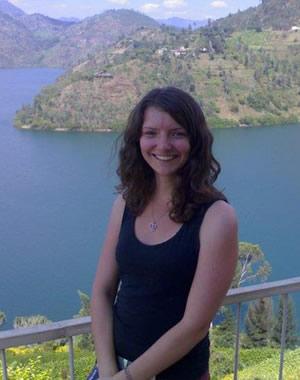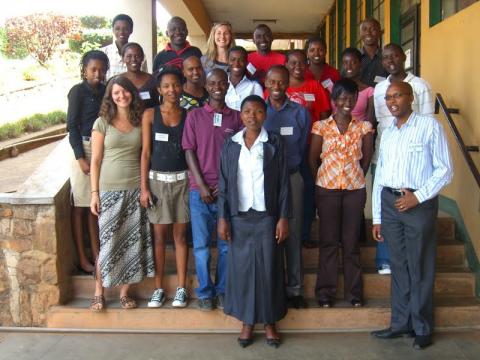
UNH alum and political science major Jacqueline Lewis completed a research project funded by the International Research Opportunities Program (IROP) in summer 2009. (Read about her IROP research in Inquiry.) We recently caught up with Jackie, who is back in Rwanda once again, this time teaching English.
Why did you decide to return to Rwanda?
It just felt right. It took me many months to think about going back, as my first trip with IROP was in many ways rough and intense, but once I had the time to process and reflect, I really was just aching to get back. I don’t know exactly why, but I feel very present when I’m here, while at home I often feel stressed, preoccupied, and all over the place. I feel more real here. Also, the more time I spend here, the more I build a community and the more comfortable and home-like it feels.
What did you do immediately following graduation?
In June 2010, right after graduation, I returned to Rwanda for a four-month internship with One Laptop per Child. I went into primary schools to support teachers who had just received laptops and were trying to integrate them into their lessons, wrote a proposal for a laptop camp, and assisted with a large teacher training in the capital.
I left at the end of September and returned home for another four months, during which I applied for jobs, worked in local retail stores, and dreamed about going back to Rwanda! I went back in January 2011 to work with Generation Rwanda.
Please tell us more about Generation Rwanda.

Jackie Lewis (front, left) with her fellow scholars at Generation Rwanda
Generation Rwanda (GR) is an American-based NGO (non-governmental organization) based in the capital, Kigali. GR provides orphaned and vulnerable youth with holistic university scholarships intended to empower them to become leaders in Rwanda’s development. This means that students don’t just receive tuition fees, but also housing, medical care, counseling services, a living stipend, and a variety of training and support services. English training is one of these services, and it’s the one that I took part in.
Where did you teach? Have you reconnected with anyone you met during your IROP experience?
I had two classrooms as I taught both in Kigali and in Butare. GR allows students to choose from seven different universities in the country, and the majority are in Kigali, followed by Butare, and then there is a small scattering of students in the east and west provinces. Nearly a third of all GR students attend the national university in Butare, which is where I conducted my IROP research. Many of the students I befriended during my time with IROP have since graduated, and many have moved to Kigali, where I live now. I do get a bit busy at times and lose touch with people, but every now and again the old friends will get together and it’s really nice. One friend just told me that he’s getting married this year, so it will be nice to be here for that.
Where did you live while working for Generation Rwanda?
During my time with GR, I lived in the volunteer house in a neighborhood of Kigali called Nyamirambo, which probably has the most character out of all places in Kigali. It is busy and bustling, and is also home to many of the Muslim community in Kigali, so there are several mosques and Islamic schools, and hearing the regular call to prayer is a daily occurrence. It was about a half hour walk from the office, which was convenient to cut down on transport expenses.
I shared the house with the Program Assistant and Career Development Assistant. I had my own room and shared a bathroom, sitting room, dining room, and kitchen. We cooked on a small gas stove and heated water in a kettle to have a warm shower. Most houses in Kigali are gated for security and privacy. Our house was in a shared compound with the landlord’s house behind, which was nice as they were a friendly family.
What was your biggest challenge as a teacher for Generation Rwanda?
One of the biggest challenges was getting my students interested in writing! It’s more of an oral culture, and students’ perceived needs were often different than their actual needs. Most didn’t see the importance in writing properly, though everyone loved practicing conversation, especially through debates. Ultimately I found a few activities for them to practice their writing that they really enjoyed, and that was good as writing tended to be the weakest language area for most students.
As it was so difficult to sell the value in writing, it was really rewarding when the light bulb flicked on and some students really got it. I noticed the improvement even in email writing in one student, and I commented on it. He told me that he had been using my editing checklist with everything that he did—emails, assignments, you name it. It was nice to see that I had reached him. Probably one of the biggest things I learned with teaching, especially with the limitations of my program which allotted just one hour a week per student, was that successfully mastering something small was much more realistic and effective than taking a bite bigger than you can chew. Small successes were really rewarding.
What’s next for you?
I finished my time with GR in December 2011. Overall I really enjoyed teaching there. I’m still living and working in Kigali, which is working out well for me. I’ve since moved to another neighborhood on the other side of town. I have two roommates, and am now enjoying hot showers! In January 2012 I started teaching at a new international primary school, and in February I'll start teaching night classes at an English language training center. I don’t know for sure how it will all play out, but I plan to spend the next two years or so here before grad school. I’m in it for the long haul!
